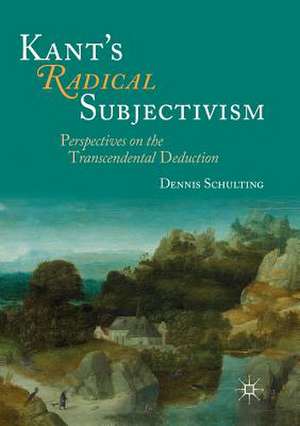Kant's Radical Subjectivism: Perspectives on the Transcendental Deduction
Autor Dennis Schultingen Limba Engleză Paperback – 28 iul 2018
Novel interpretations are provided of such central themes as the objective unity of apperception, the threefold synthesis, judgement, truth and objective validity, spontaneity in judgement, figurative synthesis and spatialunity, nonconceptual content, idealism and the thing in itself, and material synthesis. One chapter is dedicated to the interpretation of the Deduction by Kant’s most prominent successor, G.W.F. Hegel, and throughout Schulting critically engages with the work of contemporary readers of Kant such as Lucy Allais, Robert Hanna, John McDowell, Robert Pippin, and James Van Cleve.
Preț: 701.40 lei
Preț vechi: 825.17 lei
-15% Nou
Puncte Express: 1052
Preț estimativ în valută:
134.21€ • 140.50$ • 111.05£
134.21€ • 140.50$ • 111.05£
Carte tipărită la comandă
Livrare economică 07-21 aprilie
Preluare comenzi: 021 569.72.76
Specificații
ISBN-13: 9783319829326
ISBN-10: 3319829327
Pagini: 442
Ilustrații: XVI, 442 p.
Dimensiuni: 148 x 210 mm
Greutate: 0.54 kg
Ediția:Softcover reprint of the original 1st ed. 2017
Editura: Springer International Publishing
Colecția Palgrave Macmillan
Locul publicării:Cham, Switzerland
ISBN-10: 3319829327
Pagini: 442
Ilustrații: XVI, 442 p.
Dimensiuni: 148 x 210 mm
Greutate: 0.54 kg
Ediția:Softcover reprint of the original 1st ed. 2017
Editura: Springer International Publishing
Colecția Palgrave Macmillan
Locul publicării:Cham, Switzerland
Cuprins
Preface.- Key to Abbreviations of Cited Primary Works.- 1. Kant’s Radical Subjectivism - An Introductory Essay.- PART I: FROM APPERCEPTION TO OBJECTIVITY.- 2. Kant’s Deduction From Apperception.- 3. “Pure Consciousness Is Found Already in Logic”: Apperception, Spontaneity, and Judgement.- 4. Gap? What Gap?—On the Unity of Apperception and the Necessary Application of the Categories.- PART II: NONCONCEPTUAL CONTENT, SPACE, AND A PRIORI SYNTHESIS.- 5. Problems of Kantian Nonconceptualism and the Transcendental Deduction.- 6. Kant’s Threefold Synthesis On a Moderately Conceptualist Interpretation.- 7. Figurative Synthesis, Spatial Unity, and the Possibility of Perceptual Knowledge.- PART III: SUBJECTIVISM, MATERIAL SYNTHESIS, AND IDEALISM.- 8. On Hegel’s Critique of Kant’s Subjectivism in the Transcendental Deduction.- 9. Subjectivism, Material Synthesis, and Idealism.
Notă biografică
Dennis Schulting is former Assistant Professor of Metaphysics and its History at the University of Amsterdam, Netherlands, and obtained his PhD in Philosophy from the University of Warwick, UK, in 2004. He specialises in Kant and German Idealism, with a focus on issues in philosophy of mind, epistemology and metaphysics. He has published in journals such as the Philosophical Review, Kantian Review, Kant-Studien, Kant Yearbook, Studi kantiani, Tijdschrift voor Filosofie, Algemeen Nederlands Tijdschrift voor Wijsbegeerte and the Hegel Bulletin, and has contributed essays to multiple book volumes. He is author of Kant’s Deduction and Apperception: Explaining the Categories (Palgrave Macmillan, 2012), and editor of Kantian Nonconceptualism (Palgrave Macmillan, 2016).
Textul de pe ultima copertă
In this book, Dennis Schulting presents a staunch defence of Kant’s radical subjectivism about the possibility of knowledge. This defence is mounted by means of a comprehensive analysis of what is arguably the centrepiece of Kant’s Critique of Pure Reason, namely, the Transcendental Deduction of the Categories. Radical subjectivism about the possibility of knowledge is to be understood as the thesis that the possibility of knowledge of objects essentially and wholly depends on subjective functions of thought, or the capacity to judge by virtue of transcendental apperception, given sensory input. Subjectivism thus defined is not about merely the necessary conditions of knowledge, but nor is it claimed that it grounds the very existence of things.
Novel interpretations are provided of such central themes as the objective unity of apperception, the threefold synthesis, judgement, truth and objective validity, spontaneity in judgement, figurative synthesis and spatialunity, nonconceptual content, idealism and the thing in itself, and material synthesis. One chapter is dedicated to the interpretation of the Deduction by Kant’s most prominent successor, G.W.F. Hegel, and throughout Schulting critically engages with the work of contemporary readers of Kant such as Lucy Allais, Robert Hanna, John McDowell, Robert Pippin, and James Van Cleve.
Novel interpretations are provided of such central themes as the objective unity of apperception, the threefold synthesis, judgement, truth and objective validity, spontaneity in judgement, figurative synthesis and spatialunity, nonconceptual content, idealism and the thing in itself, and material synthesis. One chapter is dedicated to the interpretation of the Deduction by Kant’s most prominent successor, G.W.F. Hegel, and throughout Schulting critically engages with the work of contemporary readers of Kant such as Lucy Allais, Robert Hanna, John McDowell, Robert Pippin, and James Van Cleve.
Caracteristici
Engages critically with contemporary readers of Kant Presents a detailed discussion of the Transcendental Deduction of the Categories Offers comprehensive arguments within the framework of Kant’s radical subjectivism Includes supplementary material: sn.pub/extras
